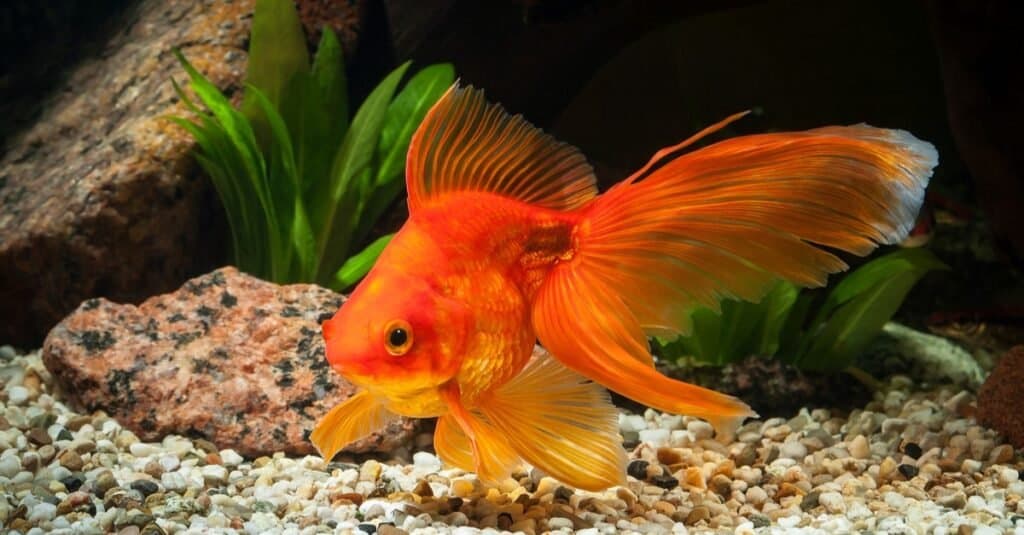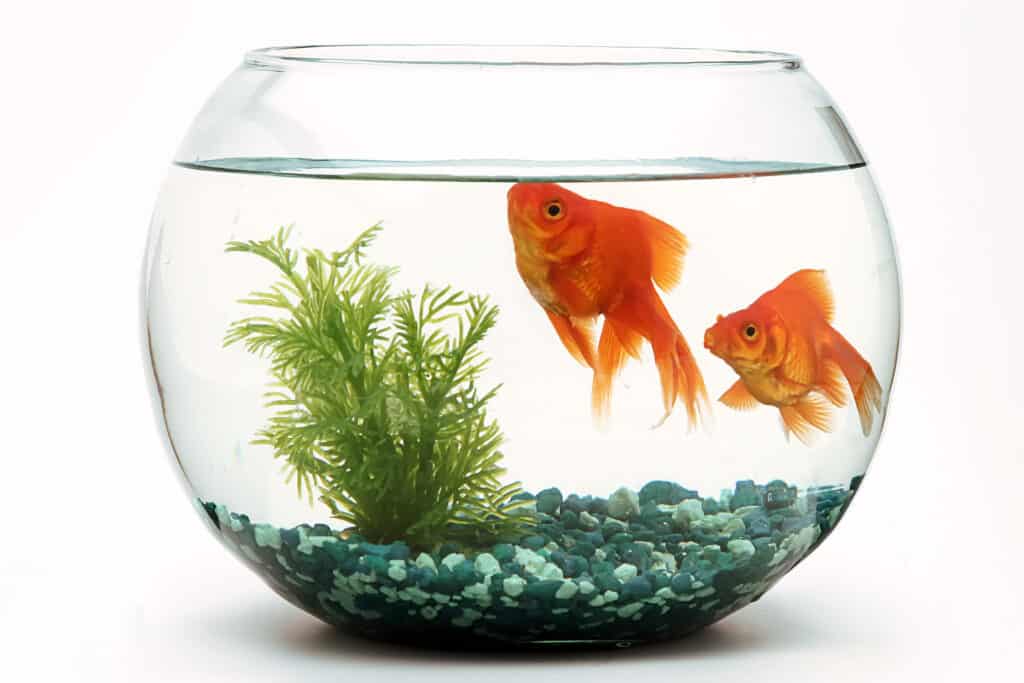Goldfish are a common fish discovered in pet shops, in aquariums, at fairs, and swimming in ponds around the world. Most people know someone who won one of these fish as a prize and some varieties are less than a dollar each from feeder fish merchants. Did you know that common goldfish live a long time? We’ll discover the oldest goldfish ever recorded now.
What is a Goldfish?
Goldfish are domesticated carp and are closely related to both common and crucian carp. Colorful carp were popular in China as ornamental animals and by 1200 CE, the first true goldfish came into existence. There are various kinds of goldfish including common, bubble eye, comet, ranchu, oranda, and celestial eye varieties.
Common goldfish are often mass bred as feeder fish for animals such as Oscars and freshwater turtles. They shouldn’t be a primary food source, however, as they’re high in fat and low in other needed nutrients.
While there are many different types of goldfish, they are all the same species. Their various appearances have been carefully managed by long-term selective breeding which results in a wide variety of available characteristics. This is like how a dachshund and a Great Dane are both still dogs.

Goldfish belong to the Cyprinidae family and the Carassius genus.
©dien/Shutterstock.com
Tish: The Oldest Goldfish Ever Recorded
Tish is the oldest goldfish ever recorded at 43 years old. It died on August 6, 1999, after being won at a fair in 1956. This fish was recognized as the oldest goldfish ever a year before passing away.
Hilda and Gordon Hand were his owners after their son, who originally won 2 fish, left Tish behind when he got married. The second fish named Tosh died in 1975. Hilda was 72 when she finally buried the fish in her garden in Thirsk, North Yorkshire, England.
This goldfish was around 4.5 inches long and wasn’t overfed. The fish was also moved into the sunlight occasionally which the owners believed increased his quality of life. Since Tish tried to jump out of his bowl, a net was kept over the top of his bowl to keep him in his water.
Tish was originally a bright orange color when he was first acquired. By the time he died, he had changed into a silver-colored fish. He was normally kept in a bowl in a hallway and ate Tetra brand food.
Goldie: The Oldest Goldfish Without Official Records
The oldest goldfish that ever lived but didn’t have official records was Goldie. Goldie died in 2005 at the age of 45.
His owners knew he was dying because he spent time resting on his tank’s bottom before passing away. As he aged over the years, his color changed from an orangish-yellow color to a faint pink.
He was acquired in 1960 and was passed down to Pauline Evans by her parents in the 1990s. Initially, the fish had been won by the Evans children at a fair in the seaside town of Budleigh Salterton along with two other fish.
The Evans lived with Goldie in Bradninch, Devon, England. He was buried in the family’s garden. While the true gender of the fish was never known, the family assumed he was male and referred to him as such.
Are Goldfish Good Prizes?
No, goldfish make terrible prizes at fairs, festivals, and parties. They have a long lifespan yet they aren’t healthiest in simple bowls. Traveling in a bag is also traumatizing and may cause shock which leads to death.
To live a good life, goldfish need a filtered aquarium and possibly a pond upon maturity. This isn’t accessible to most common game fairgoers and game players. Because the weight of pet ownership isn’t given proper consideration in the heat of the moment, fish shouldn’t be given away as prizes.
Many goldfish are neglected or released into local non-native environments. As an invasive species that grows large, goldfish are capable of decimating ecosystems that aren’t prepared to handle a new large predator.
Why Do Goldfish Get So Old?
Most fish don’t die of old age and they continue to grow until they are killed, their environment changes to their detriment, they run out of food, or they become diseased. Goldfish will live for decades and grow indefinitely in the right environments.
Goldfish usually live around 10 to 30 years though some live much shorter or longer. More aesthetic goldfish are a product of the selective breeding of common goldfish and have a shorter life expectancy than run-of-the-mill goldfish.
Water quality plays a big role in the health of a goldfish. Since goldfish produce a lot of waste, their water needs to be changed frequently. If it isn’t, a fish will more easily succumb to various diseases.

Goldfish have huge eyes, and their senses of smell and hearing are excellent.
©LUIS PADILLA-Fotografia/Shutterstock.com
Is Stunting Bad for Goldfish?
Yes, it’s bad for a goldfish to have its growth stunted. Water quality and inadequate space cause deformities and other health complications which lead to early death.
Some fish do not stop growing at a certain age and a goldfish in the proper environment will get large. Goldfish that aren’t stunted often reach a foot in length or more. Some of the bigger fish can also weigh more than a couple of pounds.
A goldfish’s color fades as it ages. However, it will also fade if the fish isn’t given access to some sunlight.
What Are Feral Goldfish?
Feral goldfish are unwanted pets released into the wild that thrive as an invasive species in non-native ecosystems. Depending on the size of the body of water that they’ve entered, they can grow to the size of footballs and beyond. Goldfish are adaptive and they’re omnivorous so they exploit more food sources than other varieties of fish.
The widespread release of goldfish in the United States has become a major problem as goldfish are only native to Asia and Eastern Europe. In states like Minnesota, hundreds of thousands of fish have been removed from lakes. They eat the eggs of local fish and uproot native plants which is devastating if large populations of goldfish exist in delicate habitats.
The photo featured at the top of this post is © Darko Cvetanoski/Shutterstock.com
Thank you for reading! Have some feedback for us? Contact the AZ Animals editorial team.






